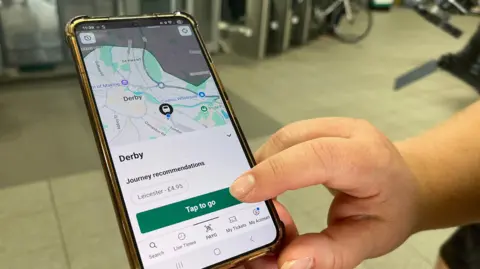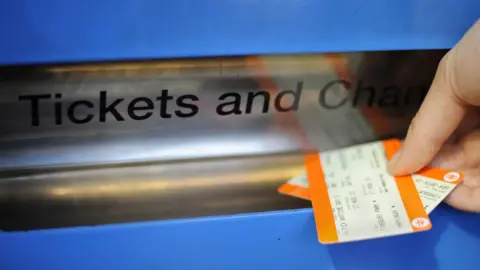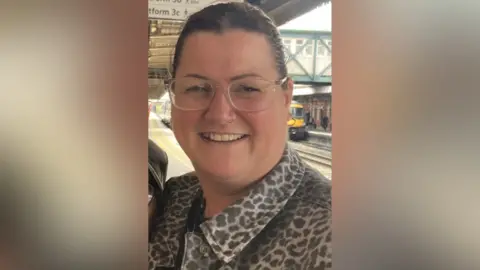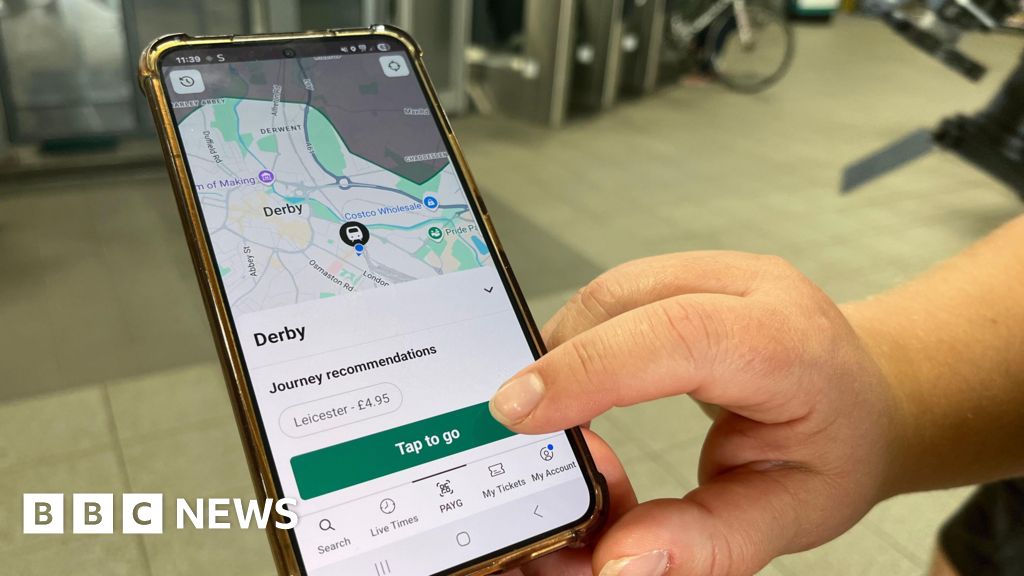Isaac AsheBBC News, Derby
 BBC
BBCTicketless train travel that works by tracking passengers’ locations is being trialled in the East Midlands.
The location-based technology will be tested by East Midlands Railway (EMR) from Monday, by up to 1,000 people travelling through Derby, Leicester, Nottingham and the stations in between.
The app promises to automatically charge these passengers “the best fare at the end of the day”.
Further 1,000-person trials will take place on three services run by rail operator Northern in Yorkshire from the end of September, the Department for Transport said.
The technology has already been tested widely in Switzerland, Denmark and Scotland but this marks the first time the trials have been brought to England’s rail network.
It uses global positioning system (GPS) tracking on users’ mobile phones to automatically charge passengers the best overall fare at the end of the day, including on CrossCountry as well as EMR.
If multiple journeys are made, the government said it would calculate if a season ticket would have been cheaper.
For ticket inspections and to pass through barriers, the app will generate a bar code to scan.
Passengers can sign up to the trial, called Digital Pay As You Go, through EMR’s website.
‘Long overdue’
EMR’s head of commercial strategy and business planning Oli Cox said more than 500 people had expressed an interest in signing up.
He said “complex” fares were sometimes “a real barrier” for passengers and added: “This trial removes that uncertainty, making it easy to simply tap in and out on your phone, safe in the knowledge you’re always getting the best-value fare on the day.”
EMR added the trial would not affect the decision to install ticket barriers limiting access to platforms from the footbridge through Nottingham railway station.
Trials will begin running on Northern services between Harrogate, Leeds, Sheffield, Doncaster and Barnsley at the end of the month.
The EMR and Northern trials will run for nine months and have been given £1m of government funding as part of its Plan for Change.
Rail minister Lord Peter Hendy said testing ticketless travel should save passengers both time and money.
He said: “The railway ticketing system is far too complicated and long overdue an upgrade to bring it into the 21st Century.”
 PA Media
PA MediaThe trial has received a mixed response from passengers, with some saying they would rather see rail bosses prioritising things like upgrading air-conditioning and improving carriage cleanliness.
Rebecca Butler, 44, said she thought the trial was a “good idea” but felt she did not travel enough to use the tracking system.
She said: “It would be much easier because you could just go on an ad-hoc basis and I feel like we have to organise [travel] quite far in advance at the moment.”
However Ms Butler said she was unsure how the system would work for people travelling with children or dependents.

Natasha Grice, director for rail at independent watchdog Transport Focus, said: “This trial is a great opportunity to look at the use of digital technology to make it easier for passengers to access the railway.
“Rail users tell us that value for money is important to them, and the results of this trial will be helpful in shaping the future of fares and ticketing.
“We will be engaging with train operators involved to see how the trial has gone and will be interested to see the passenger insight it generates.
“Whilst digital technology provides an opportunity for the retailing of fares, it is also important not to forget those that don’t or can’t easily adopt a digital solution and ensure that the best value fares are accessible to everyone.”


